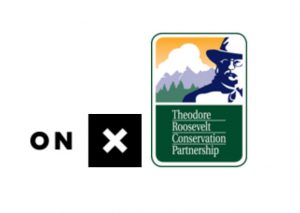 From TRCP:
From TRCP:This week, onX and the Theodore Roosevelt Conservation Partnership revealed the stunning results of a collaboration to quantify how many acres of state lands across the West are entirely landlocked by private land and, therefore, inaccessible to hunters, anglers, and other outdoor recreationists.
This is the anticipated follow-up to last year’s study of federally managed public lands, which showed that more than 9.52 million federal acres have no permanent legal access because they are isolated by private lands.
The Findings on State Land
Using today’s leading mapping technologies, more than 6.35 million acres of state lands across 11 states in the American West were identified as landlocked by private lands. The detailed findings are now available in a new report, “Inaccessible State Lands in the West: The Extent of the Landlocked Problem and the Tools to Fix It,” which also unpacks how this problem is rooted in the history of the region.
“Based on the success of last year’s landlocked report, we decided to turn our attention to the West’s 49 million acres of state lands, which are important to sportsmen and women just like national forests, refuges, and BLM lands,” says Joel Webster, Western lands director with the Theodore Roosevelt Conservation Partnership. “State trust lands, parks, and wildlife management areas often provide excellent hunting and fishing, yet 6.35 million acres of them are currently landlocked and inaccessible to the public. Together with our previous findings, the TRCP and onX have produced the most comprehensive picture of this access challenge across the West.”
The new report and companion website break down landlocked acre totals for each of 11 states. Montana, Arizona, New Mexico, and Wyoming each have more than one million acres of landlocked state lands, creating existing barriers and future opportunities for public access.
“Handheld GPS technologies have revolutionized how the recreating public finds and uses state and federal lands, making millions of acres of small tracts of public lands easy to discover and explore, both safely and legally” says onX founder Eric Siegfried. “GPS technologies have also helped the recreating public become personally aware that inaccessible public lands are scattered across the Western landscape, and onX is eager to help identify the extent of the landlocked challenge and showcase the collaborative tools to fix it.”
Landlocked Acres by State
• Arizona: 1,310,000 acres
• California: 38,000 acres
• Colorado: 435,000 acres
• Idaho: 71,000 acres
• Montana: 1,560,000 acres
• Nevada: < 1,000 acres
• New Mexico: 1,350,000 acres
• Oregon: 47,000 acres
• Utah: 116,000 acres
• Washington: 316,000 acres
• Wyoming: 1,110,000 acres
While the analysis looked at various types of state-administered land, such as state parks and wildlife management areas, the vast majority—about 95 percent—of the landlocked areas identified are state trust lands. Trust lands were long ago granted by the federal government to individual states and are generally open to public recreation in all Western states except Colorado.
“Each year, hunters and anglers across the West enjoy some of their best days outdoors utilizing state land access,” adds Siegfried. “If we can work together to unlock state lands for the public, many more sportsmen and women will have those experiences in the years ahead.”
The Solutions
The report also highlights the various ways in which states are and can be addressing this issue, so that effective solutions can be more widely adopted across the West. Several states have made significant progress with dedicated staff and programs for improving access, and by utilizing walk-in private land hunting access programs to open up state land. Additionally, state-side grants made possible by the Land and Water Conservation Fund, which was permanently reauthorized earlier this year, offer another promising tool to address the landlocked problem.
“Many states have embraced the opportunity to open these lands to recreational access, and it is our hope that this report will help decision-makers find ways to tackle the challenge more completely,” says TRCP’s Webster. “This includes Congress doing its part by passing legislation that would establish full and dedicated annual funding for the Land and Water Conservation Fund, which must direct 40 percent of all dollars towards state and local projects.”
The TRCP is encouraging hunters and anglers to support full, permanent funding of the LWCF through its online action tools here.
Learn more and download the full report at unlockingpubliclands.org.
The mission behind onX is to always know where you stand: to give outdoor enthusiasts more information about their surroundings than they ever thought possible. onX strives to create the most complete, current, and accurate mapping information available, including landownership, roads, trails, and other access-related data. By providing people the best and most up-to-date data and GPS technology in the palm of their hand, onX seeks to help people have the best outdoor experiences possible.
Inspired by the legacy of Theodore Roosevelt, the TRCP is a coalition of organizations and grassroots partners working together to preserve the traditions of hunting and fishing. By ensuring access to quality fish and wildlife habitat, we’re also safeguarding the $887 billion that sportsmen and women help contribute to the American economy.



